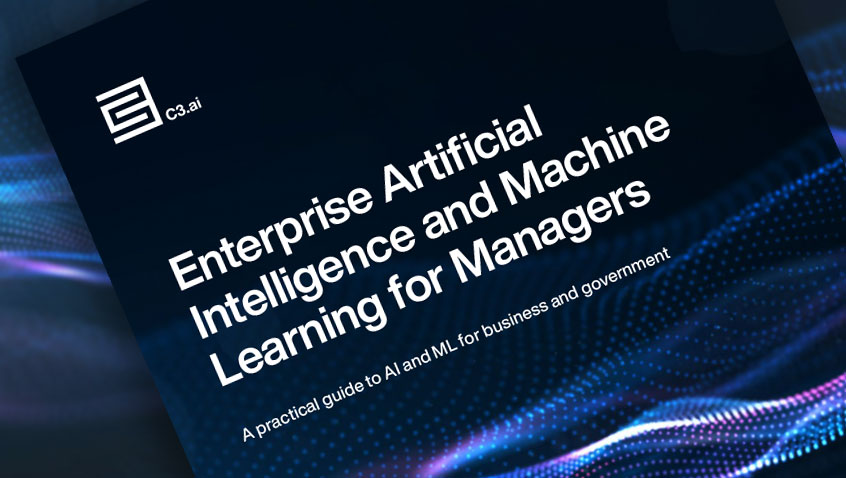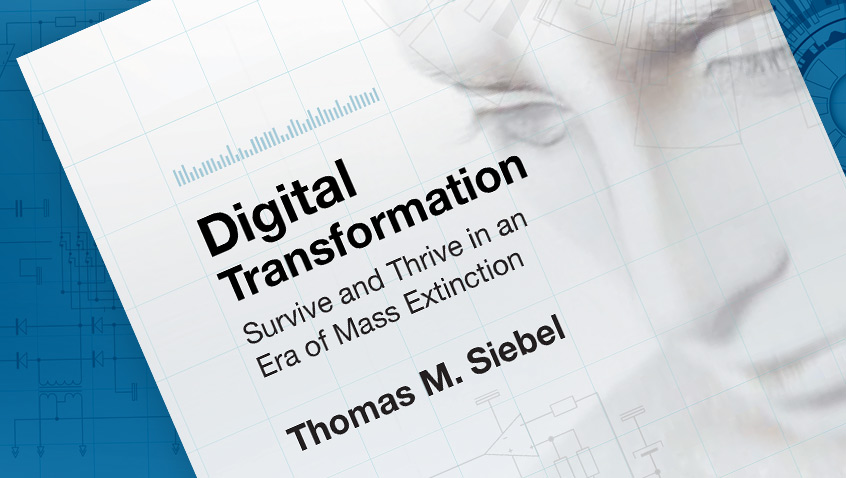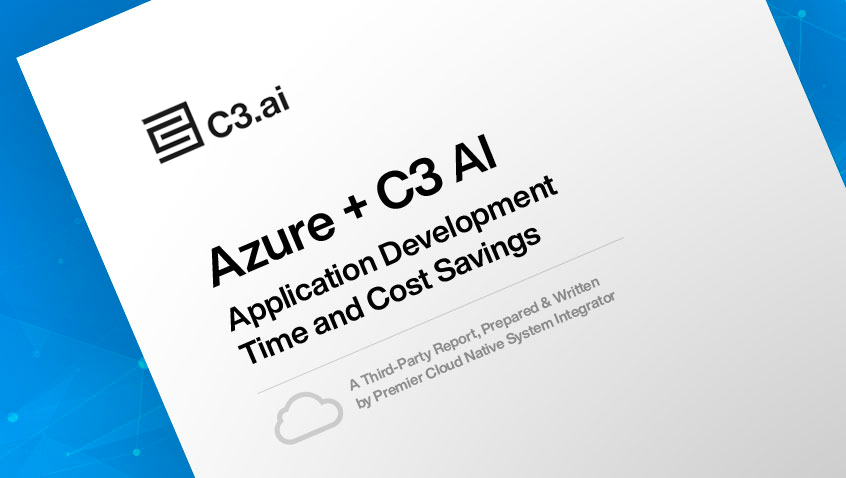- AI Software
- C3 AI Applications
- C3 AI Applications Overview
- C3 AI Anti-Money Laundering
- C3 AI Cash Management
- C3 AI Contested Logistics
- C3 AI CRM
- C3 AI Decision Advantage
- C3 AI Demand Forecasting
- C3 AI Energy Management
- C3 AI ESG
- C3 AI Health
- C3 AI Intelligence Analysis
- C3 AI Inventory Optimization
- C3 AI Process Optimization
- C3 AI Production Schedule Optimization
- C3 AI Property Appraisal
- C3 AI Readiness
- C3 AI Reliability
- C3 AI Smart Lending
- C3 AI Supply Network Risk – bak
- C3 AI Turnaround Optimization
- C3 Generative AI Constituent Services
- C3 Law Enforcement
- C3 Agentic AI Platform
- C3 Generative AI
- Get Started with a C3 AI Pilot
- Industries
- Customers
- Events
- Resources
- Generative AI for Business
- Generative AI for Business
- C3 Generative AI: How Is It Unique?
- Reimagining the Enterprise with AI
- What To Consider When Using Generative AI
- Why Generative AI Is ‘Like the Internet Circa 1996’
- Can the Generative AI Hallucination Problem be Overcome?
- Transforming Healthcare Operations with Generative AI
- Data Avalanche to Strategic Advantage: Generative AI in Supply Chains
- Supply Chains for a Dangerous World: ‘Flexible, Resilient, Powered by AI’
- LLMs Pose Major Security Risks, Serving As ‘Attack Vectors’
- What Is Enterprise AI?
- Machine Learning
- Introduction
- What is Machine Learning?
- Tuning a Machine Learning Model
- Evaluating Model Performance
- Runtimes and Compute Requirements
- Selecting the Right AI/ML Problems
- Best Practices in Prototyping
- Best Practices in Ongoing Operations
- Building a Strong Team
- About the Author
- References
- Download eBook
- All Resources
- Publications
- Customer Viewpoints
- Blog
- Glossary
- Developer Portal
- Generative AI for Business
- News
- Company
- Contact Us
Glossary
- Artificial Intelligence
- AI Agents
- AI in Finance
- AI in Manufacturing
- Anomaly Detection
- Anti-Money Laundering
- Asset Performance Management
- Asset Reliability
- Demand Forecasting
- Digital Disruption
- Digital Transformation
- Digital Twin
- Elastic Cloud Computing
- Energy Management
- Enterprise AI
- Enterprise AI Platform
- Ethical AI
- Inventory Planning
- IoT Platform
- Know Your Customer (KYC)
- Machine Vision (Computer Vision)
- Model-Driven Architecture
- Multi-Cloud
- No Code
- Predictive Analytics
- Predictive Maintenance
- Process Optimization
- Production Scheduling
- Stochastic Optimization
- Supply Chain Management
- Type System
- Data Unification & Management
- Machine Learning (A to L)
- Artificial General Intelligence
- Bias
- Canonical Schema
- Canonical Transform
- Classification
- Classifier
- Classifier Performance
- Clustering
- Coefficient of Discrimination, R-Squared (R2)
- Convolutional Neural Network (CNN)
- Correlation
- Data Cleansing
- Data Labels
- Data Lineage
- Deep Learning
- Dimensionality Reduction
- Explainable AI
- F1 Score
- False Positive Rate
- Feature Engineering
- Feedback Loop
- Field Validation
- Gaussian Mixture Model (GMM)
- Generalized Linear Models
- Gradient-Boosted Decision Trees (GBDT)
- Features
- Ground Truth
- Holdout Data
- Hyperparameters
- Information Leakage
- LIME: Local Interpretable Model-Agnostic Explanations
- Linear Regression
- Loss Function
- Low-Dimensional Representation
- Machine Learning (M to Z)
- Mean Absolute Error
- Mean Absolute Percent Error
- Machine Learning Pipeline
- Model Drift
- Model Prototyping
- Model Training
- Model Validation
- Normalization
- Overfitting
- Precision
- Problem Tractability
- Random Forest
- Recall
- Receiver Operating Characteristic (ROC) Curve
- Regression Performance
- Regularization
- Reinforcement Learning
- Reporting Bias
- Ridge Regression
- Root Mean Square Error (RMSE)
- Selection Bias
- Shapley Values
- Supervised Machine Learning
- Tree-Based Models
- Underfitting
- Unsupervised Machine Learning
- XGBoost
Energy Management
What is energy management?
Energy management is the strategic monitoring, planning, and optimization of energy usage within organizations to reduce energy costs, improve energy efficiency, and achieve sustainability objectives. It encompasses a wide range of activities including meter and utility bill tracking, maintenance and retrofits to improve equipment efficiency, and demand management to reduce energy costs, among others.
What is energy management software?
Energy management software helps organizations monitor and optimize their energy consumption. Many solutions integrate and visualize data from utility bills, meters, and Internet of Things (IoT) devices in near real-time so operations, energy, and sustainability teams can identify energy efficiency opportunities for specific facilities and pieces of equipment. In manufacturing, energy management solutions are often part of a suite of asset performance management solutions that monitor industrial assets.
Why is energy management software important?
Organizations adopt energy management software to maximize energy efficiency, reduce energy costs, and lower scope 1 and 2 greenhouse gas (GHG) emissions. Energy management software enhances an organization’s energy efficiency activities by integrating utility bills and aggregating energy load data to monitor consumption across multiple facilities or plants. Plants, energy, and sustainability managers use this unified view to identify improvement opportunities.
What is AI-driven energy management?
AI-driven energy management is the practice of using advanced machine learning (ML) and artificial intelligence (AI) techniques to (1) disaggregate energy consumption and emissions to specific equipment, (2) predict future energy consumption, and (3) automatically identify energy savings opportunities. Incorporating AI into energy management software is critical to helping organizations take a proactive approach to achieving energy efficiency goals.
AI-driven energy management accelerates an organization’s efforts to identify and act on energy efficiency opportunities. It continuously identifies deviations from predicted energy consumption, provides AI-powered recommendations to improve performance, and enables facility and plant managers to augment technical expertise via generative AI co-pilots. AI-driven energy management systems allow organizations to move beyond static and backward-looking energy monitoring to dynamic, predictive, and action-oriented energy management.
By implementing AI-driven energy management software, organizations can:
- Generate AI-driven consumption and efficiency baselines and forecast energy use at the equipment, facility, and company level
- Conduct gap-to-potential analysis that compares actual performance with potential performance, prioritizing high-value opportunities
- Continuously monitor energy consumption and emissions in near-real time across all equipment, production lines, and facilities
- Unify siloed data from meters, utility bills, and unconventional sources such as sensor historians, operational manuals, MES, ERP, power grid mix, and weather services
- Automatically track and report energy efficiency project impact using ML algorithms
- Improve engineering productivity and upskilling with generative AI copilots to augment technical expertise
How does C3 AI enable AI-driven energy management?
C3 AI Energy Management provides AI forecasts and recommendations to maximize energy efficiency, reduce energy costs, and lower GHG emissions at scale. The application enables operations and sustainability teams to monitor, predict, and optimize the efficiency of all utilities, including energy, water, and waste. C3 AI Energy Management has been deployed across a wide range of industries, including chemicals, manufacturing, utilities, and facilities management for buildings.
C3 AI applications are built on the C3 AI Platform, an end-to-end platform for developing enterprise AI applications. The C3 AI Platform offers a scalable and secure approach to enterprise AI, providing the necessary tools and capabilities to quickly design, develop, and operate advanced, industrial-scale AI applications.
The unique model-driven architecture of the C3 AI Platform allows organizations to build AI applications with less code, time, and effort compared to other methods. It features an end-to-end architecture to integrate with existing enterprise software systems, ingest into domain object models, apply out-of-the-box and configurable AI algorithms, and enable end-user interaction through intuitive, simple user interface applications.
C3 AI also provides a proven methodology and best practices for customer developers to configure, extend, and develop proprietary AI applications. C3 AI shares this methodology in a center of excellence collaboration model, delivering proven results as demonstrated by a decade of experience working with some of the world’s largest organizations on industrial-scale use cases.



